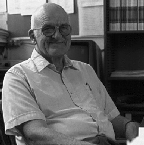
RESEARCH DESCRIPTION:
Our research emphasizes the physical interpretation of thermodynamic properties in terms of the magnitudes of intermolecular pair energies and simple equations of state. We have shown that a wide variety of phenomena can be accounted for qualitatively, and frequently semiquantitatively, in terms of a general model based upon the van der Waals equation of state: the immense variety of phase equilibria in binary fluid mixtures, lower critical solution temperatures in hydrocarbon mixtures, tricritical phenomena, the special features of symmetrical systems (e.g., mixtures of enantiomers), changes of sign of excess enthalpy with temperature, and many others.
The various thermodynamic properties of binary mixtures show the same kind of non-classical (i.e., non-analytic) behavior in the critical region as is observed near the one-component gas-liquid critical point. Careful measurements of these properties have yielded values of the non-classical critical exponents.
We have found that certain ternary mixtures simulate binary mixtures, but permit the experimenter to vary continuously the magnitude of the "binary" interaction, and thus to approach a tricritical point in a systematic way. A wide variety of measurements (coexistence curves, light scattering, interfacial tensions) have been made on the three-phase region of three "quasi-binary" systems, especially ethane + (n-heptadecane + n-octadecane). We have also studied the three-phase region of ternary mixtures of two nearly monodisperse fractions of polystyrene (of widely differing chain length) in methylcyclohexane, a system that shows tricritical phenomena. All the results are consistent with the theoretical prediction that the approach to the tricritical point is governed by exponents that are essentially "classical," but amplitude ratios are non-classical.
KEY CONCEPTS AND WORDS:
Physical Chemistry: statistical and experimental thermodynamics of liquids and liquid mixtures, with particular application to phase equilibria and critical phenomena, including tricritical phenomena; polymer solutions.